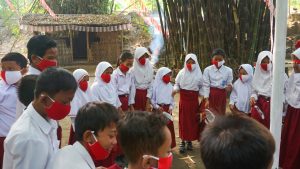Yesterday, Indonesia’s government announced that it had started administering COVID-19 vaccinations to children aged between 6 and 11, Reuters reported, joining a small group of Asian nations that have started to immunize the very young.
Maxi Rein Rondonuwu, a senior health ministry official, told a briefing on Sunday that the rollout will begin in the capital Jakarta and its vast periurban surrounds and that about 26.5 million children have been targeted for vaccination.
“This is being done to accelerate vaccinating everyone in Indonesia…we’re strengthening herd immunity,” he said, adding that the government approved the Chinese-made Sinovac Biotech vaccine for the age group last month. Of Indonesia’s more than 4.2 million confirmed COVID-19 infections, 13 percent have afflicted those aged under 18, according to government data cited by Reuters.
While Indonesia experienced one of Southeast Asia’s worst outbreaks in this year, cases have flat lined in relative terms in recent months. At its height in July and August, the country was regularly recording daily caseloads of more than 50,000, a figure that has since dropped to just a few hundred. Yesterday, Indonesian health authorities recorded just 190 new cases.
But despite recent progress, Indonesian health authorities are far from attaining widespread vaccination coverage, in part due to the logistical challenges of distributing them across the full breadth of the archipelago. As of this week, the country had fully vaccinated 37 percent of the population, and administered one dose to another 16 percent.
Indonesia is not the first nation to begin vaccinating children. China has already started inoculating children aged three and above, while Cambodia began doing so for children aged 6-12 in September. Singapore said last week it would start vaccinating children before the end of this year.
The government’s decision reflects a clear desire to get children back to school and ensure that the resumption of classes, which began in September after 18 months of in some cases constant school closures, does not lead to fresh outbreaks of the coronavirus, especially given the recent appearance of the Omicron variant. Since the beginning of the pandemic, more than 60 million Indonesian children have been affected by nationwide school closures, according to UNICEF.
The curious thing, however, is that the other Asian nations that have opened up vaccinations to children have done so after attaining considerably higher vaccination rates than Indonesia. China has fully vaccinated 75 percent of its population, while Cambodia has inoculated 80 percent and Singapore 87 percent.
This disjuncture suggests that the Indonesian government is prioritizing the expansion of vaccination coverage in the megapolis of Greater Jakarta, both due to its dense population and its economic centrality, in order to lift it to herd immunity ahead of the rest of the country. Such a decision is consistent with President Joko Widodo’s response to COVID-19, which has been criticized for prioritizing economic recovery over public health. This goal is also reflected in the government’s announcement last month that it would begin offering COVID-19 booster shots to the public once 50 percent of the population is inoculated.
That said, Indonesia has done well to flatten its curve of infections to the extent that it has, and the inoculation of its younger residents will help to ensure that the country can consolidate its progress and prevent any backsliding.

































